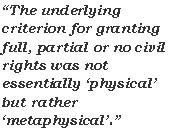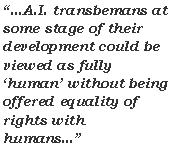Past Imperfect: Ancient Legal Codes and Future Transbeman Law - Precedents, Problems & Paradoxes
Professor Sam N. Lehman-Wilzig
Page 2 of 5
The ancients were not stupid: they could well see that people they considered to be inferior (sub-human) were not  different in any physical or biological sense. What they did believe is that for all sorts of reasons certain people were either intellectually or morally inferior: women, other races, certain social groups (castes), etc. Thus, the underlying criterion for granting full, partial or no civil rights was not essentially “physical” but rather “metaphysical”. As I shall show later in my talk, this is an important distinction for us as well because of some contemporary and potential future trends. Let us now briefly look at the central categories used in the past.
different in any physical or biological sense. What they did believe is that for all sorts of reasons certain people were either intellectually or morally inferior: women, other races, certain social groups (castes), etc. Thus, the underlying criterion for granting full, partial or no civil rights was not essentially “physical” but rather “metaphysical”. As I shall show later in my talk, this is an important distinction for us as well because of some contemporary and potential future trends. Let us now briefly look at the central categories used in the past.
1) Animals: It may seem strange to start off a list of human categories with animals, but there are two good reasons why I do so. The second reason will become obvious a little while later; the first reason is the principle found in some legal systems (like the ancient Jewish) between “dangerous” (e.g. a goring ox) and non-dangerous animals (e.g. docile sheep). The former demanded a much higher level of supervision by its master, whereas the latter did not. In other words, ancient law ascribed consciousness to animals (otherwise no supervision would be necessary at all) but not volition, the ability to choose one’s behavior – we knew in advance which animal would behave in a certain way.
 To be sure, these two concepts are not simple. “Consciousness” does not necessarily entail self-consciousness– just because we can see that an animal is alive with brain activity, this does not mean that it is self-aware of that activity or even of itself in other than the most superficial fashion (its body itches, so the animal scratches). However, without taking us too far afield, I would argue that self-consciousness is not a critical attribute for our purposes, but rather at the basic level it is “consciousness” (sentience) which is determinative of a being’s rights, and at a higher level “volition”. But volition itself is a very tricky concept legally and philosophically.
To be sure, these two concepts are not simple. “Consciousness” does not necessarily entail self-consciousness– just because we can see that an animal is alive with brain activity, this does not mean that it is self-aware of that activity or even of itself in other than the most superficial fashion (its body itches, so the animal scratches). However, without taking us too far afield, I would argue that self-consciousness is not a critical attribute for our purposes, but rather at the basic level it is “consciousness” (sentience) which is determinative of a being’s rights, and at a higher level “volition”. But volition itself is a very tricky concept legally and philosophically.
An animal that attacks a predator in self-defense is making a volitional decision, but we would probably argue that it is instinctual and thus not a result of “real” free will. However, how much of what humans do is devoid of “instinct”, “reflex” or “unconscious” behavior (this can include hormonally driven action; “brainwashing” – otherwise called “education”; brain configuration as a result of individual genetic makeup; etc.)?
In the case of future AI Transbemans – as in ancient law – I think the distinction between consciousness and volition will be critical, for once the latter enters the picture we will have crossed the Rubicon [1] from treating the Transbeman entity as some form of animal to a being of a higher order, from which we have to find other legal categories.
2) Slaves: Here we find several legal systems with varying approaches to the abilities and liability of such “entities”. Jewish Law held that masters are not liable for their slave’s injurious actions because slaves have the ability to understand the consequences of their behavior. Roman law accepted this principle for criminal liability but not for civil liability. American slave law followed this too, and even banned civil liability if the slave caused harm in defending himself!
We see here that despite their being considered as mere chattel/property, slaves were also understood to have volition, i.e. behaving autonomously. In other words, in the case of future AI Transbemans, the fact that they may start out as property does not prevent the law or society from also perceiving them as having autonomous mental capabilities, with all the attendant legal and perhaps social ramifications of such a perspective.
3) Diminished Capacity: English Common Law [2] distinguished between two types of human adults who had less than full legal rights. First, those with a “Mental Deficiency”, such as retarded and otherwise intellectually handicapped people (e.g. stroke victims); second, those with a “Mental Disease”, such as insanity, hallucinations,  uncontrollable urges as a result of temporary extreme distress, etc. Here we find people with legal independence (in theory) losing some rights permanently or temporarily as a result of intellectual incompetence. Note that I said “some” rights and not all, because certainly one could not kill or maim such a person (not always true regarding slaves). In other words, AI Transbemans at some stage of their development could be viewed as fully “human” without being offered equality of rights with humans, although we would have to find some objective reason for such a diminution of their rights.
uncontrollable urges as a result of temporary extreme distress, etc. Here we find people with legal independence (in theory) losing some rights permanently or temporarily as a result of intellectual incompetence. Note that I said “some” rights and not all, because certainly one could not kill or maim such a person (not always true regarding slaves). In other words, AI Transbemans at some stage of their development could be viewed as fully “human” without being offered equality of rights with humans, although we would have to find some objective reason for such a diminution of their rights.
Footnotes
1. Rubicon - "Crossing the Rubicon" is a popular idiom meaning to go past a point of no return; the river was a Roman boundary between Cisalpine Gaul and Italy.
http://en.wikipedia.org/wiki/Rubicon August 3, 2007 4:23PM EST
2. English Common Law - a type of legal system in which the law is created and/or refined by courts on a case-by-case basis.
http://en.wikipedia.org/wiki/Common_law August 3, 2007 4:27PM EST
1 2 3 4 5 next page>